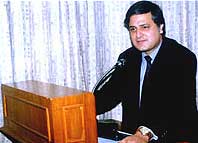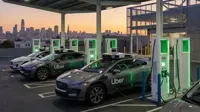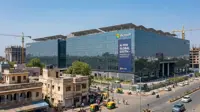Split personality
By Venkatachari Jagannathan | 27 Jun 2002
 India’s financial institutions are converting themselves into commercial banks, Infrastructure Development Finance Corporation (IDFC) cannot lag behind.
India’s financial institutions are converting themselves into commercial banks, Infrastructure Development Finance Corporation (IDFC) cannot lag behind.Posting an operational income that is higher than its treasury operations for the first time in five years since its inception, IDFC, the country’s first specialised institution to fund infrastructure projects, is switching lanes. After coming of age last fiscal, IDFC is planning to transform itself into an investment banker (See IDFC comes of age).
 "We are in the process of restructuring the set-up. Soon we will communicate about that," is what IDFC managing director and chief executive officer Nasser Munjee will say.
"We are in the process of restructuring the set-up. Soon we will communicate about that," is what IDFC managing director and chief executive officer Nasser Munjee will say.The change is warranted as the finance minister, during his budget speech, had said that IDFC will be the coordinating agency for all infrastructure projects exceeding Rs 250 crore. In addition, the minister also announced creation of a Rs 100-crore Infrastructure Equity Fund that will be managed by IDFC.
The change also makes financial sense for IDFC. With its disbursements and sanctions going up in a healthy fashion compared to earlier years, IDFC will not be in a position to fund all the viable projects.
"We are no longer flush with funds; those days have gone. Now we are accessing the market for funds," says Munjee. Last fiscal the company raised Rs 250 crore and so far this year IDFC has raised Rs 100 crore through non-convertible debentures. "Our funds requirement is around Rs 1,200 crore."
In addition IDFC’s cost of funds is around 10.5 per cent and today corporates are in a position to raise debt at cheaper rates. "So it makes sense for us to become an investment banker," says Munjee. Last fiscal the total interest payout for IDFC was around Rs 167 crore on a debt of Rs 1,650 crore.
The interest cost is likely to come down this year with the delinking of the dividend rate with the rate of interest on its Rs 650-crore subordinated debt from the Indian government (Rs 300 crore) and the Reserve Bank of India (Rs 300 crore). Last fiscal the interest outgo on this debt was Rs 65 crore, and IDFC’s dividend percentage is 10 per cent.
Munjee says as per the revised loan terms, IDFC will pay an interest equivalent to the rate of five-year government securities plus 25 basis points. Further, the debt period has been extended to the year 2050 from 2012.
The company can also cash on the intellectual capital it has developed over the past five years in understanding the various issues plaguing the infrastructure sectors by having a separate outfit for advisory functions. The company is getting assignments from several state governments and their arms.
Though it would don a new role, IDFC’s primary goal — to lead private capital to commercially viable infrastructure projects — remains intact. "It is only the form that is going to be different," he says.
Restructuring apart, IDFC, initially set up to fund power and telecom sectors, is broad-basing its focus areas to include tourism, education, health, agriculture infrastructure, and oil and gas (production and transportation). These areas offer better scope for private participation as they are largely now under the government domain.
"The power sector is a laggard while telecom is marching ahead with lots of private investment," says Munjee. As a matter of fact IDFC’s exposure to the telecom sector grew substantially last year while there was a corresponding decline to the power sector.
The company approved financial assistance for nine projects totalling Rs 1,545 crore last fiscal while disbursements were Rs 817 crore. On the other hand approvals for nine energy projects were around Rs 381 crore while disbursements totalled to Rs 155 crore.
"We cancelled our sanctions to several independent power projects last year. As and when the projects fructify we will assist them," Munjee says. On the whole it was a gratifying FY-2002 for IDFC with net approvals (excluding cancellations and pre/repayments) and disbursements/commitments being Rs 2,810 crore and Rs 1,297 crore, respectively.
The net cumulative outstanding approvals and disbursements/non-funded commitments amounted to Rs 6,486 crore and Rs 2,851 crore, respectively. Sanctions to the tune of Rs 3,207 crore were cancelled last year and the repayments/pre-payments amounted to Rs 429 crore.
The company’s total income went up by Rs 91 crore to Rs 405 crore while its net profit increased by Rs 46 crore to Rs 186 crore. The increased disbursements and the resultant increase in interest income will silence critics who faulted IDFC from earning handsome profits from treasury operations rather than lending to projects.
"For the first time in our existence our operational income exceeded income from treasury operations," says a satisfied Munjee. Last fiscal the interest income was Rs 267 crore while the income from investments was at Rs 138 crore. During 2000-01, IDFC’s interest income was Rs 136 crore while the income from investments was Rs 178 crore.



















